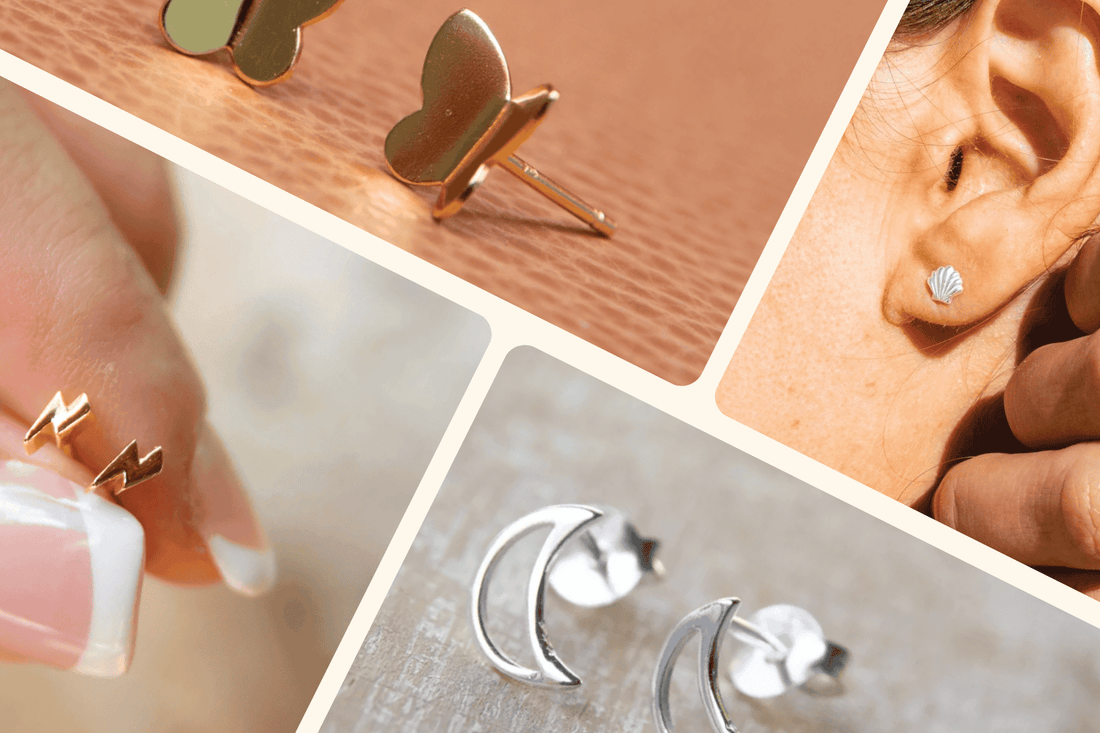
Jewellery for Sensitive Ears: The Metals & Finishes You Should Know
If your earlobes flare up at the slightest touch of metal, you’re not alone - and you don’t have to give up on gorgeous earrings. At Cove & Coast, we believe jewellery should bring joy, not discomfort. In this guide, we’ll walk you through the metals and finishes that work best for sensitive ears, why some cause irritation, and how to spot safe pieces without sacrificing style.
What Counts as a “Sensitive Ear”?
If your ears get red, itchy, swollen or painful when wearing earrings, you likely have sensitive ears. Many of these reactions are caused by metal allergy or irritation - especially when the jewellery contains nickel or base metals that mingle with sweat and skin oils.
Symptoms can include itching around the post or back, redness, flaking of the skin behind the ear, and even crusting or discharge in persistent cases. The good news? With the right materials and finishes, you can wear beautiful earrings without the aftermath.
What Causes the Irritation?
- Nickel is the most common culprit. Cheap earrings often use nickel as an alloy or base metal - and nickel ions can trigger allergic contact dermatitis.
- Low-quality alloys or plating: If an earring is gold-plated over a base metal, once the plating wears off you might be exposed to reactive metals underneath.
- Rough or unfinished posts/backs: Even if the metal is safe, poor finishing can irritate sensitive skin.
- Moisture + salt + skin oils: Sweat and salt can accelerate corrosion of metal alloys and increase skin contact with irritants.
The ideal earrings for sensitive ears are made of metals that are highly biocompatible (low allergenic potential) and finished well to avoid rough contact.

In this collage: Moon Studs, Lightning Bolt Studs, Frangipani Studs & Butterfly Studs.
Best Metals for Sensitive Ears
Gold-Plated (14k+ Gold or more)
Why it works: The higher the karat, the greater the gold content and fewer reactive metals like nickel. Jewellery with a 14 karat gold-plating is a safe bet.
What to watch: White gold often uses nickel as part of the alloy or plating. If you’re very sensitive, verify it’s nickel-free or rhodium-plated. Avoid gold-plated jewellery if you have strong allergies.
Sterling Silver (925) & Fine Silver (999)
Why it works: Sterling silver (92.5% pure) is often well-tolerated.
What to watch: The remaining 7.5% can include copper or nickel. Look for “nickel-free sterling silver.” Also, silver can tarnish - remove before swimming to reduce irritation.
Titanium
Why it works: Extremely low allergenic potential and completely nickel-free. Used in medical implants.
What to watch: Some “titanium-look” earrings are only coated - look for “commercially pure” or “ASTM F67 titanium.”
Surgical Stainless Steel (316L/316LVM)
Why it works: Commonly used for new piercings and sensitive ears. Corrosion-resistant, strong, and usually safe.
What to watch: Some grades still contain trace nickel - check that it’s medical-grade steel.
Niobium & Platinum
Why it works: Niobium is naturally inert and nickel-free. Platinum is hypoallergenic and highly durable.
What to watch: Higher price points; ensure authenticity if labelled niobium.

In this collage: Palm Tree Studs, Starfish Studs, Shell Studs & Love Heart Studs.
Finishes & Plating
Even if the base metal is safe, the finish matters too:
- Nickel-free or rhodium-plated: Rhodium plating can protect the skin and reduce tarnishing.
- Thicker plating lasts longer: Thin layers wear off fast, exposing base metals.
- Smooth finishes: Posts and backs should be polished to prevent friction or rubbing.
Care Tips for Sensitive Ears
- Clean earrings before first wear with mild soap and water, then dry thoroughly.
- Remove earrings before swimming or exercise.
- Store jewellery dry and separately to reduce tarnish.
- Choose lightweight styles to reduce pressure on the lobes.
- Patch test new earrings for an hour or two before all-day wear.
How We Approach It at Cove & Coast
At Cove & Coast, our jewellery is designed with coastal living and everyday comfort in mind. We carefully select metals suitable for sensitive skin - including nickel-free sterling silver, gold-plated silver, and titanium options. Explore our silver collection or discover our gold-plated range.
Quick Reference Table
| Metal / Finish | Safe Level | What to Check |
|---|---|---|
| 14k+ Solid Gold | High | Nickel-free, avoid low karat |
| Sterling Silver (925) | Moderate–High | Nickel-free sterling silver |
| Titanium | Very High | Pure or implant-grade |
| Surgical Steel (316L) | Moderate–High | Medical-grade, low nickel |
| Niobium / Platinum | Very High | Authentic materials |
Final Thoughts
If you’ve struggled with irritation from earrings, the problem usually lies in the metal or finish. Choosing sterling silver earrings, (gold-plated or just silver) or ones made of titanium makes a world of difference. You deserve earrings that feel as good as they look - effortless, coastal, and kind to your skin.
FAQs
Can I wear gold-plated earrings if I have sensitive ears?
Possibly, but only if the base metal underneath is non-reactive (such as sterling silver).
Is sterling silver always safe?
Not always. Some sterling silver contains trace nickel. Look for nickel-free sterling silver or opt for titanium if you react easily.
What are the safest earrings for new piercings?
Implant-grade titanium, niobium, or solid gold (14k+) are best for healing and preventing irritation.
Does the finish matter?
Yes. A poor-quality finish can cause irritation even if the base metal is safe. Smooth, nickel-free finishes are ideal.
Can I swim with sensitive ears?
Only if your earrings are made of corrosion-resistant metals like titanium or surgical steel. Always rinse and dry after swimming.

